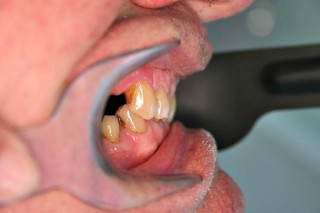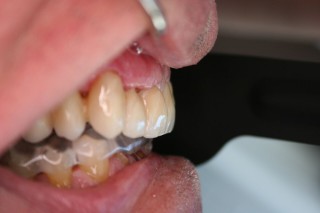What is bruxism?
Bruxism is a functional disorder consisting of grinding or gnashing of the teeth, and produced at day or night, although it is most commonly and difficult to detect during sleep.
Causes and risk factors
There is no total agreement among the medical community on the causes of bruxism. It does not appear alone, but usually associated with dream disorders like sleep apneas, hallucinations, REM sleep behavior disorders or snoring, and it seems to be very linked to the stress patients suffer during daytime and their level of anxiety. Sleep positions, malocclusion, consumption of alcohol, coffee and tobacco as well as some medicines may also cause the grinding of the teeth.
Occlusion problems are frequently caused by this disorder. Improper alignment of teeth, jutted out pieces, improper alignment of teeth fillings or prostheses, crowns or bridges that do not get adjusted are the reasons why our mandible is forced to certain positions and try to file the obstacle.
Bruxism may also appear due to orthopedic problems that cause a wrong placing, also to neurologic diseases or even to disorders coming from mistaken placing of dental prostheses or bad teeth fillings.
What are the symptoms?
When bruxism occurs at daytime, it usually happens at moments of high emotional tension. Then a high and continuous presion of teeth occurs, but unrelated to mastication, as it happens with the mouth empty.
Nighttime bruxism is easily detected when we sleep with someone, basically because we do not let our partner to sleep with such a noyse.
In case nobody warns us about our disturbing habit, we can detect it thanks to other symptoms.
Anxiety, stress, headache or insomnia usually come with bruxism, as well as muscle pain of the face and mouth, ear pain, sensitive teeth to hot or cold foods, trouble when moving the mandible or even tight shoulder muscles.
We will suffer in our mouth unusual erosion of the teeth, fractured teeth, inflammation and receding gums, excessive mobility of teeth and premature tooth loss.
We must take into account these symptoms have no real cause and effect function. For instance, ear pain may be not only the cause, but also the effect of bruxism.
Effects on our health
Bruxism is not a dangerous disorder in itself, but may have harmful effects in the long term as dental erosion, headaches, insomnia, inflammation of mandible tendons and joints and teeth loss. Its most alarming effect is the temporomandibular joint dysfunction, what may lead to fracture this joint, and requires a complex and painful surgery as eroded teeth can be replaced, but the TMJ cannot.



Treatment
The first thing to do if suffering bruxism is preventing its effects, and visiting a dentist qualified for treating TMJ. He will be able to carry out an occlusal inspection and a right loading splint, which gets modified during months to achieve an optimal result. Keep in mind that a splint badly done worsens the disorder, so it is convenient the professional is properly qualified.
In Artedental, we use splints like Michigan, managing not only to prevent occlusal erosion, but also to reduce bruxism in strength and frequency. They also prevent and reduce, in case they exist, problems with TJM.



For psycholical causes, it is recommended to visit a therapist in order to find a solution or just to help us to learn how to get relaxed.
There are certain actions we can do ourselves like:
.Avoiding hard foods lije chewing gum.
. Drinking water abundantly during the day.
. Learning relaxation techniques.
. Using cold or wet hot in the joint.
. Making our own facial, neck and shoulder massages and flexibility and stretching exercises in all this area to recover normal function of muscles.
. Consciously trying to keep the right position of the mouth, with a light separation of the jaw.
If your teeth grind, visit the dentist and take life easy and relaxed.
Follow us in Facebook




